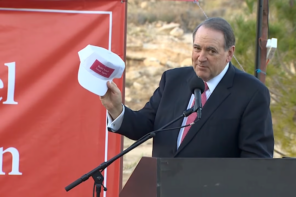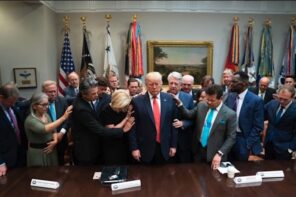The Trump administration’s latest gift to its far-right, white conservative Christian base is the DOJ’s “religious freedom” memo, which is actually a pair of documents purporting to instruct all government agencies how to be appropriately deferential to those who express religious inclinations. The memo—which does not carry the weight of law—keeps pace with this administration’s fawning embrace of the worldview expressed by the white conservative evangelicals who helped carry Trump to the White House. And while the order can be accurately read as the precursor to a sweeping “license to discriminate,” the fact that it’s a memo, and not even an executive order, suggests that it fits neatly within another trend that Trump and his cronies continue to display: the braggadocious showmanship that panics his opponents, but doesn’t really change anything. (See also: the contraceptive mandate rollback and May’s “religious freedom” executive order, which the DOJ memo references as its impetus.)
The current cultural conversation around “religious freedom”—especially the discussion emanating from the White House—is likely to be settled (for a time, at least) by this time next year. What will have changed by then? The Supreme Court will have issued its ruling in at least one (and possibly more) major cases directly addressing the Constitutional right for, say, business owners to turn away customers based on the owner’s “sincerely held religious beliefs.” That’s a question directly addressed in the DOJ’s memo handed down Friday, but it’s also a question that will be argued before the highest court in the land this term. And while predicting a particular decision from that court is a fool’s errand, the blunt and sweeping constitutional questions presented to the court by cases like Masterpiece Cakeshop will be answered. At that point (and arguably, even presently), whatever diatribes administration officials have scrawled on paper will need to be reassessed—or, more likely, abandoned entirely.
Surely, there are individuals within the current administration who know this. Even if Trump shows no respect for the rule of law or co-equal branches of government, there must be some career civil servants who can see the writing on the wall, or who have some historical regard for the political independence of the judiciary. But in true Trump style, the administration is seizing on the current confusion to suggest a new normal—issuing a memo that attempts to use bedrock constitutional principles to advance the Christian dominionist tendencies of an administration that is disinterested in protecting actual bedrock constitutional principles.
Issuing a memo like the DOJ did Friday, hot on the heels of an equally ineffectual (because it already existed) “religious exemption” for contraception coverage offered by faith-based employers, essentially amounts to standing in the middle of an empty pool, screaming about how it’s empty—disregarding the fact that it’s October, that all the pools have been drained for the season, and that there’s already a plan in place for when and how to refill them.
It makes those doing the screaming feel important, and—crucially—it makes those who were looking forward to diving back into the water think twice about doing so, suggesting they need to question their entire understanding of something as fundamental as, you know, water. But ultimately, it doesn’t change the fact that you can’t fill the pool because it will freeze, and it has no bearing on when the pool does in fact get filled again. (In this analogy, the Supreme Court is the final arbiter that sets the timeline for when and which pools get refilled.)
This latest memo offers solutions on the same scale: which is to say, none. It just bemoans the claim that “religious freedom” is under attack in the U.S.—while simultaneously proving that the people who are launching that attack (from the highest halls of power, no less) are the same ones decrying their own “oppression” by the principles upon which this nation was literally founded.




